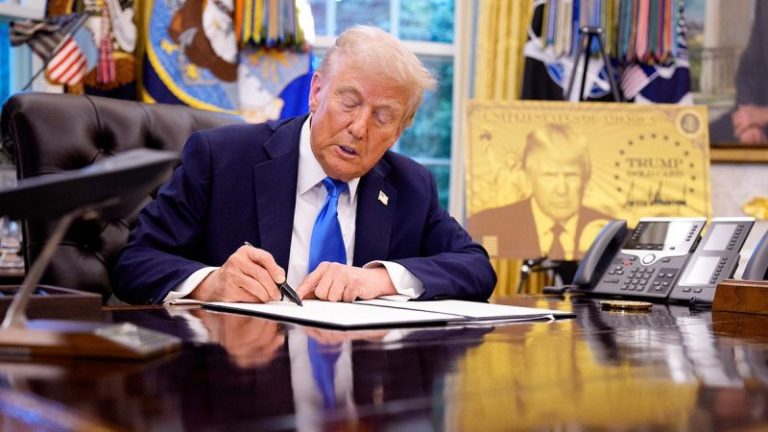Saga Metals Corp. (‘SAGA’ or the ‘Company’) (TSXV: SAGA,OTC:SAGMF) (OTCQB: SAGMF) (FSE: 20H), a North American exploration company focused on critical mineral discoveries, acknowledges the recent announcement by The White House and Donald Trump of ‘Project Vault,’ a large-scale U.S. strategic stockpile initiative intended to strengthen domestic supply chains, advance national security priorities, and reduce reliance on foreign-controlled sources of critical minerals and raw materials.
Project Vault—announced in the Oval Office with participation from Export-Import Bank of the United States (‘EXIM’) — establishes the U.S. Strategic Critical Minerals Reserve as an independently governed public-private partnership designed to store essential raw materials across U.S. facilities.
EXIM has approved a Direct Loan of up to US$10 billion to support Project Vault, providing long-term financing for a partnership between original equipment manufacturers and private-sector capital providers—an effort EXIM has positioned as strengthening U.S. production and processing capacity, insulating manufacturers from supply shocks, and advancing U.S. national economic security objectives.
The stockpile is the latest move by the Trump administration to build a Western supply chain to counter China’s dominance in critical minerals — especially when it comes to refining. Beijing sought to cut off exports of rare earths, a subset of critical minerals, last year during trade disputes with the U.S.
A Media Snippet accompanying this announcement is available by clicking on this link.
Preferential trade alignment and allied coordination on display at the Critical Minerals Ministerial in Washington, D.C.
The U.S. efforts to diversify and stabilize critical minerals supply chains are expanding beyond domestic stockpiling toward allied coordination. On February 4, U.S. Vice President JD Vance outlined plans aimed at organizing partners into a preferential trade framework for critical minerals, including mechanisms intended to promote market stability and reduce vulnerability to price undercutting and supply disruption.
Canada’s Foreign Affairs Minister Anita Anand was in Washington on Wednesday as the Trump administration made a case for international partners to join a preferential trade zone for critical minerals with forced price floors.
Canada and the U.S. Department of Defense already have a co-investment deal to accelerate Canadian mining development and strengthen critical minerals supply chains.
A Media Snippet accompanying this announcement is available by clicking on this link.
Titanium: A national defense critical mineral facing supply chain constraints
Titanium remains a cornerstone material for aerospace and defense platforms, infrastructure, and high-performance industrial uses, and continues to be a strategic concern for Western supply chains due to limited domestic sourcing and processing capacity. Titanium is deemed a critical metal by the U.S., EU and Canada and is essential for defense and aerospace applications due to its strength-to-weight ratio and corrosion resistance.
Titanium is characterized as a critical mineral for defense and aerospace, with supply-chain risk concentrated in titanium metal pathways (including aerospace-grade sponge capacity and certification) rather than in pigment markets. The vast majority – over 90% globally of mined titanium is processed into the pigment – a looming supply chain gap UK-headquartered market intelligence company Project Blue outlines in a recent report.
‘Titanium is essentially a defence metal – it can be up to 20% or more of the markets for total titanium consumption that goes into defence. An F 15 can be up to 40% in weight of titanium. There’s some serious volume going in these jet planes,’ Project Blue Founder and Director, Dr. Nils Backeberg
Saga Metals’ Project Focus: Critical Minerals and Titanium Exploration in Labrador
Saga Metals believes the evolving policy environment reinforces the strategic relevance of North American Critical Minerals projects that can support secure, resilient supply chains for defense, aerospace, and advanced manufacturing. The Company’s flagship Radar Ti-V-Fe Project is located in Labrador near the port community of Cartwright and is supported by existing infrastructure, including road access and proximity to tidewater logistics. Saga recently announced a 100% drilling success rate in 2025 with exceptional grades of titanium, vanadium, and iron in all 15 drill holes completed at the Radar Critical Minerals Project. The company is advancing towards a Mineral Resource Estimate and has completed four diamond drill holes in 2026 to start the year.
Mike Stier, CEO & Director of Saga Metals commented: ‘The U.S. government’s focus on critical mineral stockpiling reinforces the strategic importance of secure, allied sources of materials such as titanium—particularly for North American national security and defense-related supply chains. Saga Metals continues to advance its portfolio with a focus on critical minerals that support supply-chain security, advanced manufacturing, and future-facing technologies. We believe this policy momentum highlights the importance of investing in strategic mining projects that can help build resilience—diversifying supply, strengthening domestic and allied production capacity, and supporting stable investment conditions for the critical materials that power our economies and protect our industries.’
Key implications Saga Metals sees from Project Vault and allied initiatives
Saga Metals recognizes several key implications from Project Vault and the broader allied push toward critical-minerals security:
- Rising strategic value of titanium and other critical metals in defense readiness, aerospace manufacturing, and industrial policy.
- Potential acceleration of investment in North American exploration, development, and processing capacity as governments prioritize secure supply.
- Expanded public-private cooperation to create resilient, domestically aligned supply chains and mitigate market disruption risk.
- Increased allied coordination on pricing stability, trade frameworks, and supply diversification to reduce dependency on concentrated refining and processing pathways.
About Critical Minerals
Critical minerals are the foundation upon which modern technology is built. They are used in a wide range of essential products ranging from mobile phones and solar panels to electric vehicle batteries, medical devices and defense applications. Canada’s critical minerals list identifies 34 minerals and metals while the U.S.A identifies 60 minerals and metals as critical.
Investor Relations Agreement
Additionally, the Company and GRA Enterprises LLC DBA National Inflation Association (‘NIA’) entered into a consulting agreement (the ‘NIA Agreement’) for investor relations and communication services. The NIA Agreement has an initial term of twelve (12) months, at an aggregate cost of USD$100,000 for the term. Following the initial term, the NIA Agreement can be extended by three (3) months for an additional USD$30,000, six (6) months for an additional USD$50,000 or one year for an additional USD$100,000. NIA will leverage its expansive distribution channels – including targeted email lists, website features, and blog content – to highlight the Company’s growth story and project developments.
NIA, based in Mooresville, North Carolina, has a strong track record of investor communications for publicly traded companies. The Company will not issue any securities to NIA as compensation. NIA and its principals are at arm’s length to the Company. NIA currently has no direct or indirect interest in the securities of the Company, or any right or intent to acquire such an interest.
For more information about NIA: Contact ga@gerardadams.com or visit them at 112 Camp Lane, Mooresville, North Carolina, 28117.
Qualified Person
Paul J. McGuigan, P. Geo., is an Independent Qualified Person as defined under National Instrument 43-101 and has reviewed and approved the technical information disclosed in this news release.
About Saga Metals Corp.
Saga Metals Corp. is a North American mining company focused on the exploration and discovery of a diversified suite of critical minerals that support the North American transition to supply security. The Radar Ti-V-Fe Project comprises 24,175 hectares and entirely encloses the Dykes River intrusive complex, mapped at 160 km² on the surface near Cartwright, Labrador. Exploration to date, including 4,250 m of drilling, has confirmed a large, mineralized layered mafic intrusion hosting vanadiferous titanomagnetite (VTM) and ilmenite mineralization with strong grades of titanium and vanadium.
The Double Mer Uranium Project, also in Labrador, covers 25,600 hectares and features uranium radiometrics that highlight an 18km east-west trend, with a confirmed 14km section producing samples as high as 0.428% U3O8. Uranium uranophane was identified in several areas of highest radiometric response (2024 Double Mer Technical Report).
Additionally, SAGA owns the Legacy Lithium Property in Quebec’s Eeyou Istchee James Bay region. This project, developed in partnership with Rio Tinto, has been expanded through the acquisition of the Amirault Lithium Project. Together, these properties cover 65,849 hectares and share significant geological continuity with other major players in the area, including Rio Tinto, Winsome Resources, Azimut Exploration, and Loyal Metals.
With a portfolio spanning key commodities critical to the clean energy future, SAGA is strategically positioned to play an essential role in critical mineral security.
On Behalf of the Board of Directors
Mike Stier, Chief Executive Officer
For more information, contact:
Rob Guzman, Investor Relations
Saga Metals Corp.
Tel: +1 (844) 724-2638
Email: rob@sagametals.com
www.sagametals.com
Neither the TSX Venture Exchange nor its Regulation Service Provider (as that term is defined in the policies of the TSX Venture Exchange) accepts responsibility for the adequacy or accuracy of this release.
Cautionary Disclaimer
This news release contains forward-looking statements within the meaning of applicable securities laws that are not historical facts. Forward-looking statements are often identified by terms such as ‘will’, ‘may’, ‘should’, ‘anticipates’, ‘expects’, ‘believes’, and similar expressions or the negative of these words or other comparable terminology. All statements other than statements of historical fact, included in this release are forward-looking statements that involve risks and uncertainties. In particular, this news release contains forward-looking information pertaining to the Company’s Radar Project and IR agreements listed herein. There can be no assurance that such statements will prove to be accurate and actual results and future events could differ materially from those anticipated in such statements. Important factors that could cause actual results to differ materially from the Company’s expectations include, but are not limited to, changes in the state of equity and debt markets, fluctuations in commodity prices, delays in obtaining required regulatory or governmental approvals, environmental risks, limitations on insurance coverage, inherent risks and uncertainties involved in the mineral exploration and development industry, particularly given the early-stage nature of the Company’s assets, and the risks detailed in the Company’s continuous disclosure filings with securities regulations from time to time, available under its SEDAR+ profile at www.sedarplus.ca. The reader is cautioned that assumptions used in the preparation of any forward-looking information may prove to be incorrect. Events or circumstances may cause actual results to differ materially from those predicted, as a result of numerous known and unknown risks, uncertainties, and other factors, many of which are beyond the control of the Company. The reader is cautioned not to place undue reliance on any forward-looking information. Such information, although considered reasonable by management at the time of preparation, may prove to be incorrect and actual results may differ materially from those anticipated. Forward-looking statements contained in this news release are expressly qualified by this cautionary statement. The forward-looking statements contained in this news release are made as of the date of this news release and the Company will update or revise publicly any of the included forward-looking statements only as expressly required by applicable law.










